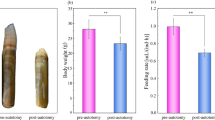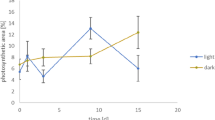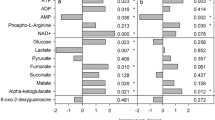Abstract
A TROPICAL papyrus swamp is a difficult environment for animal life, the mud in which the swamp worms (Oligo-chaeta, Glossoscolecidae) live is both anaerobic and strongly reducing1. In order to obtain atmospheric oxygen in these conditions, the dorsal surface of the hind end of Alma is specially modified as a respiratory organ which is exposed above the surface of the mud1. It is quite likely that Alma is biochemically adapted to life in the swamp environment.
This is a preview of subscription content, access via your institution
Access options
Subscribe to this journal
Receive 51 print issues and online access
$199.00 per year
only $3.90 per issue
Buy this article
- Purchase on Springer Link
- Instant access to full article PDF
Prices may be subject to local taxes which are calculated during checkout
Similar content being viewed by others
References
Beadle, L. C., J. Exp. Biol., 34, 1 (1957).
Mehlman, B., and Von Brand, T., Biol. Bull., 100, 199 (1951).
Author information
Authors and Affiliations
Rights and permissions
About this article
Cite this article
COLES, G. Modified Carbohydrate Metabolism in the Tropical Swamp Worm Alma emini. Nature 216, 685–686 (1967). https://doi.org/10.1038/216685a0
Received:
Issue Date:
DOI: https://doi.org/10.1038/216685a0
Comments
By submitting a comment you agree to abide by our Terms and Community Guidelines. If you find something abusive or that does not comply with our terms or guidelines please flag it as inappropriate.



